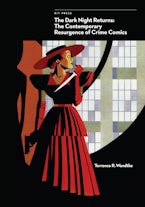
The Dark Night Returns
The Contemporary Resurgence of Crime Comics
Comics Studies Monograph Series
Published by: Rochester Institute of Technology, RIT Press
Release Date: 2015-02-01
206 Pages, 7.00 x 10.00 x 0.50 in
Other Retailers:

Published by: Rochester Institute of Technology, RIT Press
Release Date: 2015-02-01
206 Pages, 7.00 x 10.00 x 0.50 in
Other Retailers: